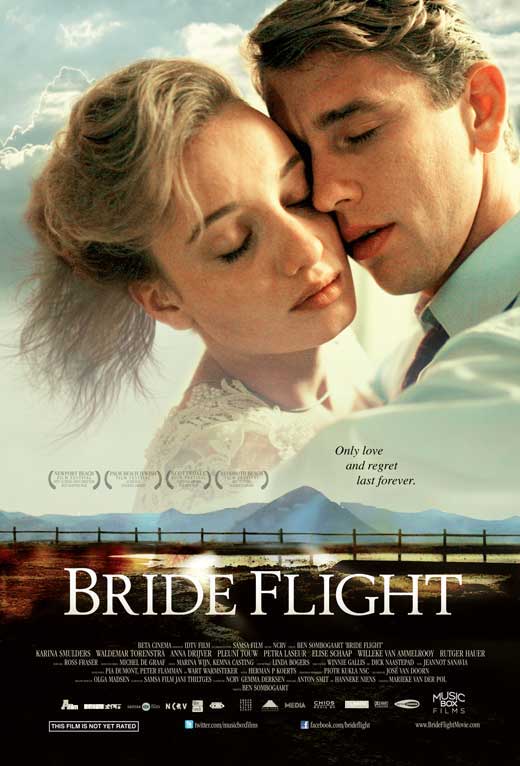
This morning, the summer semester of my movie class began with a bonus screening of the Dutch drama Bride Flight – most of the stars are unknown to American audiences, but in a small (yet essential) role is Rutger Hauer.
Synopsis
When several Dutch women emigrate to New Zealand to become war brides after World War II, their lives intertwine over several decades in many different unlikely ways.
Story
In 1953, Holland has become a desolate, hopeless place in the years since World War II. As a way of reinventing their life, a great many Dutch uproot themselves and move to New Zealand in the hope that their luck will soon change for the better. Three young women meet on a flight to this new land and befriend each other, in addition to a devilishly handsome Frank – a few years removed from his college graduation, he is setting off to start anew as an agriculturalist in this country. He quickly becomes friends with the other women, Marjorie, Esther and especially Ada – an especially lovely blonde; a powerful mutual attraction occurs immediately between Frank and Ada, but their romance will never be as she is off to live with her new husband – a man she felt compelled to marry as a way of comforting him after a profound personal loss … not to mention the fact that she is also now carrying his child.
Upon arrival in New Zealand, the four set out on their individual adventures. But are they ready for what they will find? Marjorie, eager to start a family with her new husband, has a miscarriage and is informed by her physician that she will never be able to have children of her own. Ada’s husband is a deeply religious Christian who aspires to be an elder in the church; as a result, she is unfulfilled as a woman and despite having three children with this man, remains hopelessly in love with Frank, with whom, she has exchanged numerous billets-doux over the course of the subsequent years. Frank has secured himself some land and sets out to grow grapes for the purpose of becoming a winemaker. Esther, rejecting the homespun lifestyle of a wife centered around raising children to perpetuate Jewish traditions, decides upon a career as designer of women’s clothing.
When Esther discovers she is pregnant, she arranges with Marjorie to raise the child as her own – however, over the years, tensions develop between the two women when Marjorie suspects that Esther has regretted her decision and now wants to insinuate herself into the boy’s life for the purpose of taking him from Marjorie. Ada’s husband learns of the romantic missives, they fight and she winds up leaving him to stay with Frank. With their romance rekindled, Frank now finds he must battle Ada’s husband if they are to stay together. Decades later, the three women reunite at Frank’s funeral – but after all that has transpired over the years, can they somehow find a way to resolve their differences and resume a friendship?
Review
This is one of those movies that tends to jump around considerably in time and as a result, may occasionally be a little difficult to follow as a result. The movie begins in the present day with a now elderly Frank (Rutger Hauer), having finally realized his dream of making great wine, dying in one of his vineyards shortly thereafter; it ends with the three women converged in New Zealand for his funeral. In between, we see them at various points in their life, during the 1950’s, 60’s and 70’s. Additionally, while some of “Bride Flight” is in English, much of it is in Dutch with English subtitles – in white, they are mostly surprisingly readable, except for a few scenes when they’re partially superimposed over some snow.
As you may have surmised from the above, “Bride Flight” aspires to be a broad, sweeping epic of a movie and to a large extent, it succeeds at this. But make no mistake about it – this romantic tale is a chick flick at its heart. That said, however, I found it a little difficult to take due to its heavy reliance on melodrama – there are no happy endings, just as there were no happy beginnings or happy middles either, for that matter. Despite the professional success for some, the personal life of these women seems downright miserable and depressing without any reason to believe it will improve any time soon. The only character who seems to come out of this story relatively unscathed is the man – Frank – but then again, he’s also the first one among the movie’s central characters to succumb to his own mortality.
The overwhelming majority of the class really enjoyed this movie considerably – including our instructor. However, he did make one observation with which I completely agreed: that this film will be a dismal financial failure, regardless of whether or not it gets glowing reviews. One of the reasons for this is due to the fact that that it is, of course, a foreign film with subtitles and people generally don’t like reading at the movies. But more to the point, the story focuses on a post-war event that was rather well-known and significant in Holland, but is relatively unknown in other areas of the world, including and especially the United States.

No comments:
Post a Comment
Speak Your Piece, Beeyotch!